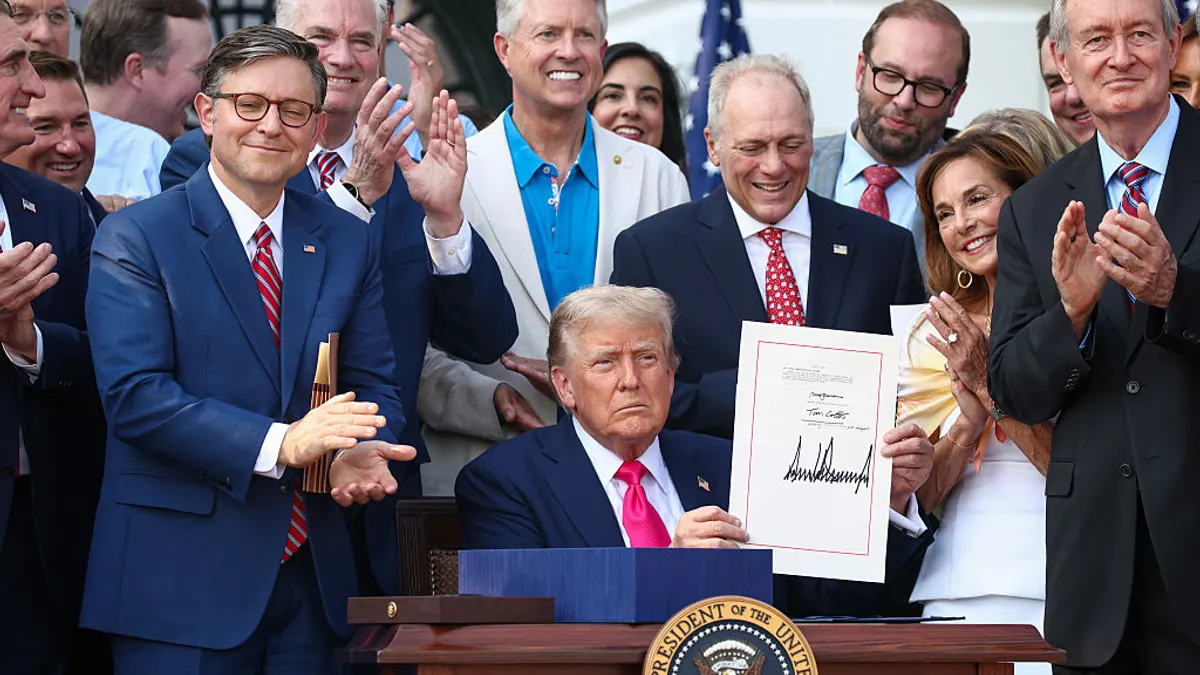The recently-enacted “One Big Beautiful Bill Act” is expected to provide a more attractive environment for U.S. merger-and-acquisition dealmaking on the tax policy front.
The new law, a central component of President Donald Trump's domestic agenda, extends many of the provisions in the Tax Cuts and Jobs Act of 2017. This provides greater certainty for dealmaking in an otherwise risky economic and policy climate, according to analysts.
Among other sweeping tax changes, the act permanently reinstates 100% bonus depreciation for qualified assets acquired after Jan. 19, 2025, eliminating a previously scheduled phase-down. It also restores a more generous definition of “adjusted taxable income” for purposes of determining a taxpayer’s allowable business interest expense deduction.
“President Trump’s Big Beautiful Bill re-arms corporate America with the same tax tools that fueled the post-2017 deal boom — 100% bonus depreciation for certain assets, generous interest deductibility and, crucially, no new carried-interest curb,” PwC U.S. Deals Platform Leader Kevin Desai said in an email. “This should mean there are more tax shields, more debt capacity, and a relative valuation boost for asset-heavy U.S companies. The question is whether the bill’s long-term debt load will come back to clip valuations once the sweeteners expire.”
U.S. M&A activity saw little growth in the first half of the year despite high hopes at the start of Trump’s second term in office, PwC said in a recent report. The total number of U.S. M&A transactions in January through the end of May was 4,535, comparable to the year-earlier period, which saw 4,515 deals, according to the Big Four accounting firm.
The report, issued before Congress passed Trump’s megabill, concluded that an M&A upswing will require more policy clarity and stability.
While the legislation will likely have a positive impact on deal momentum, the question of stability remains, according to Desai.
“We’re still in the midst of tariff negotiations, ongoing geopolitical conflicts, and the stock market is responding to the ebbs and flows of the Trump administration,” he said. “We know there are companies eager to get deals done and we believe those who will be successful in this environment are the ones who embrace the uncertainty and start positioning themselves for when the time is right.”
Mitch Berlin, Ernst & Young Americas vice chair at EY-Parthenon, said the U.S. M&A market is demonstrating “remarkable resilience” despite persistent global trade headwinds, and Trump’s megabill can only help the situation.
“We anticipate M&A is entering an era defined by fewer, but significantly larger, transactions, driven by a clear tax landscape for 2026 and beyond,” he said in an email. “This clarity and the administration’s agenda are poised to spur near-term activity especially across energy, financial services and manufacturing.”
Trump signed the One Big Beautiful Bill Act into law on July 4 after House and Senate Republican leaders scrambled to get the massive bill to his desk in the days leading up to the holiday.
Structured as a budget reconciliation package to bypass traditional filibuster rules, the bill consolidates policy priorities from 10 Senate committees into a single, sweeping legislative framework, according to an analysis by law firm Holland & Knight.
Besides tax reforms and incentives, the act includes policy changes across a wide range of areas including healthcare, energy, agriculture and defense, the report said.
“With 870 pages of provisions, the One Big Beautiful Bill Act will reshape federal policy across nearly every major sector of the American economy through significant policy shifts, funding reallocations and regulatory changes,” it said.
Several tax and regulatory provisions in the bill could significantly impact M&A, offsetting revenue losses from tax cuts while prioritizing domestic business growth, according to Mark Williams, chief revenue officer of M&A software provider Datasite.
“For example, the bill introduces higher penalty taxes for foreign investors from some countries, adding 5%–20% incremental rates on top of existing U.S. taxes, which could deter cross border deals,” Williams said in an email. “On the other hand, the bill could increase the cap on business interest expense deductions, encouraging leveraged buyouts by making debt financing more attractive.”
The bill also aims to create a more favorable environment for strategic M&A through deregulation, particularly in sectors, such as energy, financial and industrial, “where regulatory complexity and compliance costs have historically been significant barriers to dealmaking,” he added.























